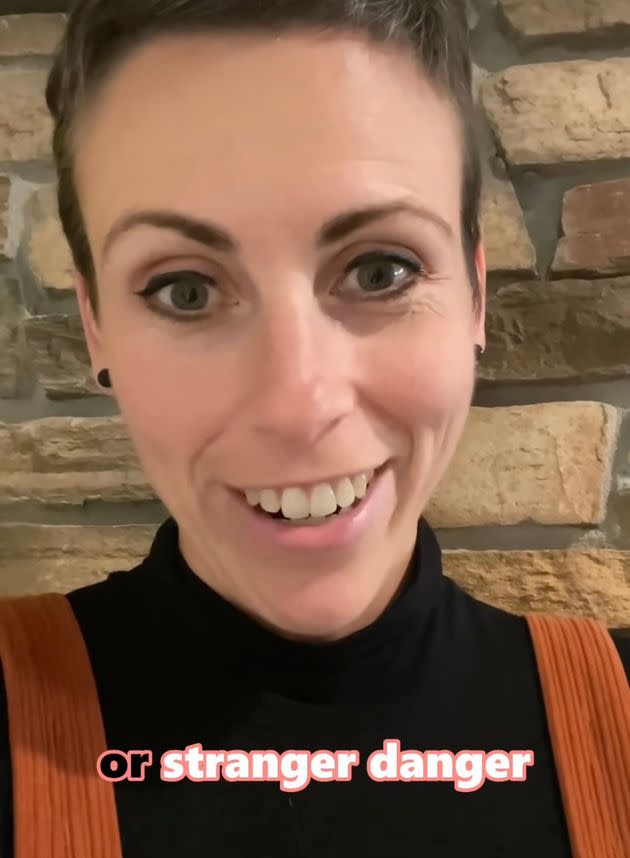This Mum Wants Parents To Stop Teaching 'Stranger Danger' And Do This Instead

The girl was alone in the playground. (Photo: Krongkaew via Getty Images)
A mum has asked other parents to stop teaching their kids about ‘stranger danger’ and to try talking about strange behaviours instead.
Mum and blogger Marcie Whalen, 40, from Alberta, Canada, says she doesn’t teach her daughters ‘stranger danger’ because she wants them “to be outgoing, have conversations with people and to ... be hospitable to those around them”.
In a Tiktok video titled ‘why to not teach stranger danger’, Whalen says she understands where it comes from – “parents are trying to protect their kids [and] keep them safe” – but, she adds, “most people are good people”.
So, instead of talking about stranger danger, she suggests talking to kids about strange behaviour instead “because children are most often abused or hurt by people they know, whether it’s a close family member or acquaintance, it’s very rarely a stranger”.
She’s right, as many as 93% of child sexual abuse victims know the abuser, according to the Rape, Abuse & Incest National Network (RAINN).

Marcie Whalen suggests focusing on strange behaviour rather than 'stranger danger'. (Photo: Marcie Whalen)
Whalen listed some dodgy behaviours that she wants her kids to be aware of such as someone asking them to keep a secret or asking them to go somewhere without their parents.
“My girls understand what to look for, whether it’s in somebody they know really well or somebody they don’t know at all, it’s categorised as strange behaviour and therefore the red flags go up,” she explains.
In the UK, there has been a gradual shift away from stranger danger, with more of a focus from child safety charities on dealing with unsafe situations. But some parents – myself included – still probably default to stranger danger when thinking of how to keep their kids safe.
The charity Action Against Abduction came up with ‘clever never goes’ after finding the stranger danger approach “doesn’t work”.
“Most strangers pose no threat to children, it’s not always strangers that try to harm children, and teaching ‘stranger danger’ creates a society full of fear and suspicion,” explains the charity.
There were more than 800 offences of non-parental child abduction recorded by police in the UK last year, so it’s important to teach children about staying safe.
‘Clever never goes’ teaches kids that they must never go anywhere with anyone – so that means a stranger or a familiar face – unless plans have been made beforehand.
“It tells them that following the rules makes them clever, gives them the confidence to trust their instincts and teaches them how to react to unsafe situations,” says the charity.
In the same vein as ‘clever never goes’, Bradford District NHS Foundation Trust urges parents to teach children how to identify and respond to threatening situations, rather than to specific people, with an emphasis on keeping them “safe, not scared”.
Tell me right away if anyone asks you to keep a secret, makes you feel uncomfortable, or tries to get you to go with them.An example of what parents could say to kids instead of warning about stranger danger.
It advises letting kids know who they can trust if they need help – such as a uniformed police officer or a teacher – and explaining they must tell a trusted adult if they have been approached by a stranger or if they feel uncomfortable about a situation.
They warn against using language like “never talk to strangers” or “stay away from people you don’t know” and instead to focus on paying attention to what people do.
You might want to tell your child: “Tell me right away if anyone asks you to keep a secret, makes you feel uncomfortable, or tries to get you to go with them.” Or “it’s important for you to ask me and get my permission before going anywhere with anyone.”
In the event that a child has a problem or becomes lost, you might want to tell them: “Don’t approach just anyone – if you need help, look for a uniformed police officer, a store clerk with a name tag, or a parent with children.”
This article originally appeared on HuffPost UK and has been updated.

 Yahoo News
Yahoo News 